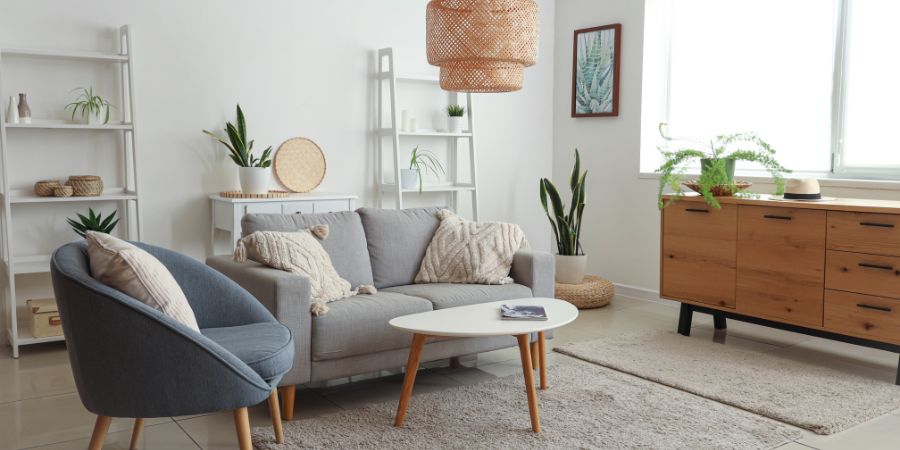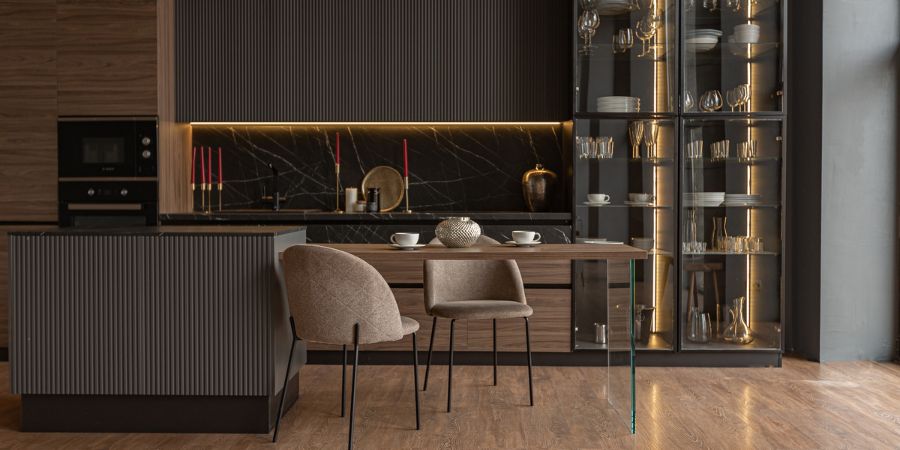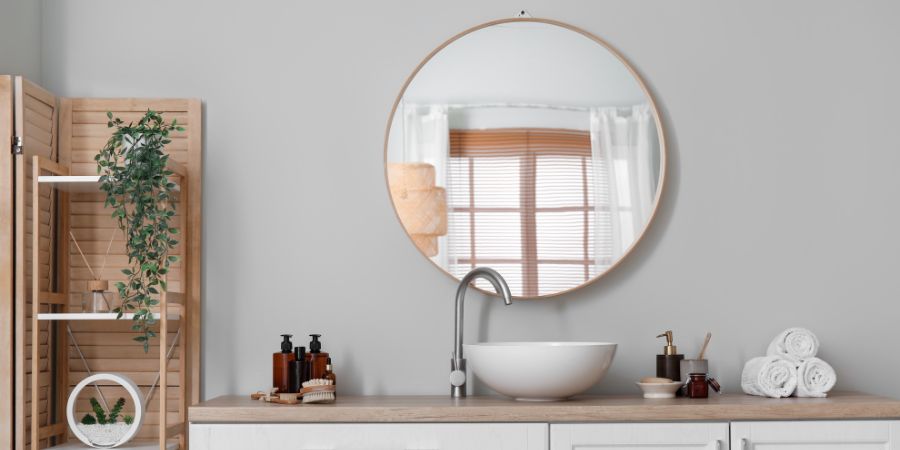Updated 2024.
- Interior design is in extremely high demand and will only continue to see a higher, increasing demand in the years to come. In fact, the global market value is estimated to reach anywhere from USD $150-186.22 billion by 2030 and see a compound annual growth rate of approx. 5.13%-7.5%!
- The average interior designer in the United States makes anywhere from USD $42,615-$111,011 per year.
- In 2024, the highest paying interior designing job in the U.S. was Interior Design Director (with a salary range of USD $86,500-$133,500).
- Interior designers are responsible for creating functional and visually appealing spaces for both residential and commercial properties.
- Job responsibilities include: meeting with clients and working with them to bring their projects to life, conducting job-related research, creating sketches/floorplans/computer models of spaces, working alongside contractors, preparing estimates, selecting furniture/fixtures/finishes and overseeing its installation, etc.
- Schooling is required to be an interior designer, with a minimum of a 4-year bachelor degree typically completed. Additional licensing may also be required in certain states.
- Pros of being an interior designer include: getting to be creative, high earning potential, potential for unlimited career growth, you can be your own boss, etc.
- Cons of being an interior designer include: it can be a competitive field to break into, you’ll first need to invest time into schooling, you may sometimes need to work long hours, etc.
- 10 alternate design career paths you can pursue WITHOUT needing a degree are: interior decorating, home staging, professional organizing, color consulting, Feng Shui design, landscape design, floral design, Aging in Place design, event decor, virtual design.
- You can pursue any of these paths – and get professionally trained and certified in them – via QC Design School’s self-paced, online training.
- QC Design School holds an A+ ranking with the Better Business Bureau, and is a subsidiary of QC Career School (which has been around since 1984).
- QC Design School has helped over 45,000+ students and graduates launch successful careers in the home design industry.

Introduction
Is interior design a good career? This is a question many people are asking themselves these days. With the rise of reality TV shows like “Home Made Simple” and “Fixer Upper”, more and more people are interested in the professional design industry.
But realistically, what does it actually mean to have a career in interior design? What would your job responsibilities be? How much money would you be making?
In this article, we’ll explore the pros and cons of working as an interior designer. We’ll also explore the various job duties you can expect to perform, salary expectations, and other important factors to consider.
Keep reading to discover whether or not interior design is a good career for YOU!
Is Interior Design a Real Career?
Of course it is! Interior design is a real, professional field that you can study and pursue as your chosen career path. Of course, like any other profession, there are both pros and cons to working in interior design.
(We’ll take a deeper look into those in a little bit!)
What Do Interior Designers Do?
Interior designers are responsible for creating functional and visually appealing spaces. This can include both residential and commercial properties. To do this, they must be able to work with clients to understand their needs and desires. Then, they must be able to translate those needs into a physical space.
This often requires being able to think outside the box and come up with creative solutions that meet the client’s budget and style preferences. Moreover, interior designers must have excellent communication skills. This is necessary in order to effectively communicate with clients, as well as other professionals (like architects and contractors) who may be involved in the project.
Become a professionally certified home designer
Turn your passion into a successful career in as little as 3 short months!
Do You Need Schooling To Be an Interior Designer?
Yes, in order to be a professional interior designer, you’ll need to have a bachelor’s degree in interior design (at the very least). In addition, many states require that designers are licensed as well. This generally requires passing a exam administered by the National Council for Interior Design Qualification (NCIDQ).
Of course, getting a degree and becoming licensed is not an overnight process. It takes time, effort, and dedication. Obtaining a bachelor’s degree alone will take approximately 4 years to complete if you do this schooling full-time and adhere to the program’s timeline.
However, if you’re passionate about design and you’re willing to put in the work, it’s definitely be worth it!
Interested in a career in design but DON’T want to have to complete a bachelor’s degree? Stay tuned – because in a little bit, we’ll reveal alternate design career paths you can take with QC Design School instead!
Working as an Interior Designer: Common Job Duties
- Meet with clients to discuss their needs/desires for the space
- Conduct research and gather information about the project
- Create sketches or computer models of the space
- Select furniture, fixtures, and finishes for the space
- Prepare cost estimates for the project
- Oversee installation of furniture/fixtures/finishes
- Provide post-project follow-up
Interior Designer Salary Expectations
Understandably, this is often one of the most important factors to consider when trying to answer the question, “Is interior design a good career?”
It’s important to keep in mind that salaries will vary depending on your:
- Experience;
- Education;
- Location;
- Service rates;
- Marketing and networking efforts;
- And various other factors.
It should also be noted that many interior designers are self-employed. When working for yourself, you have the potential to make more money – but you also have the added stress of finding your own clients and projects.

Income Averages by Country
Interior designers in the U.S. can expect to earn between USD $42,615-$111,011 per year, with the average annual salary falling around approx. USD $68,780.
In Canada, interior designers can expect to earn between CAD $48,750-$79,989 per year, with the average annual salary falling around approx. CAD $60,079.
Interior designers in the U.K. can expect to earn between GBP £29,250-£47,983 per year, with the average annual salary falling around approx. GBP £35,000.
In Australia, interior designers can expect to earn between AUD $75,000-$110,000 per year, with the average annual salary falling around approx. AUD $85,000.
Interior designers in New Zealand can expect to earn between NZD $52,000-$87,000 per year, with the average annual salary falling around approx. NZD $69,500.
In the United Arab Emirates, interior designers can expect to earn approximately AED 90,648 per year.
What is The Highest Paid Interior Design Job?
When it comes to the highest paid interior design job, it’s important to keep in mind that this will vary depending on a number of factors – including experience, education, and location.
That being said, here are some of the highest paying interior design jobs in 2024, according to this article by ZipRecruiter:
- Interior Design Director (salary range: USD $86,500-$133,500)
- Senior Interior Designer (salary range: USD $72,500-$105,000)
- Interior Decorator (salary range: USD $34,000-$87,500)
- Space Planner (salary range: USD $56,500-$87,500)
- Commercial Interior Designer (salary range: USD $60,000-83,000)
- Residential Interior Designer (salary range: USD $53,000-$79,500)
- Design Studio Consultant (salary range: USD $65,000-$75,000)
- Interior Design Consultant (salary range: USD $46,000-66,000)
Pursue a career in interior decorating
Become a certified International Design and Decorating Professional™ (IDDP™) with QC Design School’s online training!
Do Interior Designers Have a Good Future?
Yes, they do. As an interior designer, the sky is limitless in terms of the success you can find in this field!
It’s just important to keep in mind that success takes hard work, dedication, and a bit of luck. After all, there is no one formula for success. But if you’re passionate about design, have a strong work ethic, and are always looking to improve your skillset, then there’s no reason why you can’t find success in this field!
Is Interior Design in High Demand?
So far, we’ve answered the question: “Is interior design a good career?” with a resounding yes!
But what about the future? Is there potential for growth in this field? Is there currently a high demand – and will it stay that in the coming years?
And excitingly, this answer to all these questions is also yes!
For instance, according to data from this article published by JD’s All About Home on October 17th, 2024, the global interior design market was valued at an estimated USD USD $150 billion in 2023. Furthermore, they estimate that this global market value will see a compound annual growth rate (CAGR) increase of approximately 7.5% between 2024 and 2030!
This upward trajectory is similarly seen by this projection by Mordor Intelligence, wherein the interior design market size in 2025 is estimated to be valued at USD $145.01 billion – and go all the way up to USD $186.22 billion by 2030 (with a CAGR of 5.13%).
What does this mean for you?
Basically, if you’re considering a career in interior design, there’s no need to worry about job security – the demand for interior designers is only going to continue to rise over the coming years!
Pros and Cons of Interior Design
Advantages of Being an Interior Designer
- Interior design is a creative and rewarding field!
- You have the potential to earn a great salary!
- You get to help people transform their living/working spaces!
- There’s amazing job security in this field!
- There’s potential for unlimited career growth!
- You can be your own boss!
Disadvantages of Being an Interior Designer
- It can be a competitive field to break into.
- You’ll first need to invest time (at least 4 years) into your schooling.
- You may have to work long hours (especially if you’re self-employed).
- Sometimes, you may need to put in extra hours in order to meet deadlines.
- Not everyone is cut out for a career in interior design.
- If you don’t have a strong work ethic and dedication, you likely won’t succeed.
Pro Tip: Discover how to become an interior designer WITHOUT a degree!
Alternate Interior Design Career Paths That May Interest You
What if you’re interested in a career in professional design, but AREN’T interested in having to complete a bachelor’s degree (plus getting licensed, on top of that)? Luckily, there are other career paths you can pursue that will take a fraction of the time – and this is where QC Design School comes in!
QC Design School offers self-paced, online certification training – which can be completed in as little as 12 short weeks (or less) – in the following areas of home design:
- Interior decorating
- Home staging
- Professional organizing
- Color consulting
- Feng Shui design
- Floral design
- Landscape design
- Event decor
- Aging in Place design
- Virtual design
About QC Design School
A faculty of distance-learning pioneer, QC Career School, QC Design School is an online international institution that’s been around since 1984 AND holds an A+ ranking from the Better Business Bureau! All of our training programs are 100% self-paced and able to be done right from the comfort of home, with NO deadlines or due dates to worry about.
The best part?
Successful completion of our wide variety of courses will arm you with an internationally-recognized design certification + designation in your field of choice!
Here are a few handy resources to help you better get to know QC Design School:
Pro Tip: Already enrolled with QC? Make sure to join our free Virtual Community on Facebook to connect with other students/grads, share your work, and access our Student TA for any help you may need throughout your program!

Interior Design FAQ
Is interior design a reliable career?
A: Yes, interior design can be a very reliable and rewarding career! The demand for skilled interior designers continues to grow as people increasingly invest in creating functional, beautiful spaces in their homes and businesses. Whether you work independently, for a firm, or even specialize in areas like sustainable design or staging, interior design offers flexibility and a wide range of opportunities.
Like any career, success in this field depends on honing your skills, building a strong portfolio, and maintaining a commitment to professional growth. But with creativity, dedication, and the right training, interior design can provide a fulfilling and dependable livelihood!
Is interior design hard?
A: Like any career, interior design has its challenges – but it is also highly rewarding for those with a passion for creativity and problem-solving! The difficulty often depends on the specific projects you take on and how well-prepared you are.
For example, meeting client expectations, staying on budget, and managing multiple deadlines can be demanding. However, with strong organizational skills, ample training, and a genuine interest in design, you can overcome these challenges. Interior design is a field where learning never stops. With determination and the right mindset, you can turn challenges into opportunities for growth and success!
How many hours a week does an interior designer work?
A: The number of hours an interior designer works each week can vary depending on the workload, the type of projects you’re handling, and whether you’re self-employed or working for a firm. On average, full-time interior designers work around 40 hours per week.
However, during busy periods (such as when a project deadline is approaching), you may need to work additional hours, including evenings and weekends. For this reason, flexibility and time management are important skills for interior designers in order to balance your schedules effectively while maintaining a healthy work-life balance!
Helpful Resources
- How Interior Design Affects Mental Health
- How To Boost Revenue For Your Interior Design Business
- Interior Designer vs. Interior Decorator Salary
- 8 Niches That’ll Increase Your Interior Designer Salary
- How To Become an Interior Designer: Understanding Scale
- 3 Ways To Boost Your Interior Designer Salary with Social Media
- 15 Social Media Mistakes That’ll Hurt Your Design Business
- Naming Your Interior Design Business
- The Difference Between an Interior Designer and an Interior Decorator
- 15 Tips for Surviving The First 6 Months of Your Design Business
- 15 Reasons You Need Business Insurance as a Designer


Hello
I did go through all the courses and I am interested in interior decorating and home staging course and I am thinking to enrol, but I am curious to know do employers consider this certification for providing jobs to graduates, what is the marker value of QC design school graduates do they get jobs in designing firm in canada ?
Thanks
Hi Yesha, thanks so much for taking the time to comment, and we apologize for the delayed reply! Because interior decorating and home staging are unregulated industries, there is no specific qualifications that one needs to have in order to work with that designation/in that field. As such, some design firms will only require some type of experience and/or an impressive portfolio from hirable candidates – whereas others might specifically want some type of education training for those they hire. Unfortunately, because it varies from place to place and is determined by the design firm itself, there’s no one-size-fits-all answer to your question.
However, for many employers, seeing that you’ve completed certification training from a reputable school (such as QC Design School, which has an A+ ranking with the Better Business Bureau, and is affiliated with a number of esteemed design associations, such as the DDA) will be more than enough to qualify you for their company.
As for our graduates, the majority of QC’s grads prefer to launch their own businesses after graduation – and have been met with great success. That said, we’ve also had plenty of graduates go on to get hired by existing design businesses, become brand partners (such as with Benjamin Moore), etc. 🙂
I hope this helps!
All the best,
The QC Team
As technology and trends continue to evolve, how will the field of interior design adapt and change to stay relevant in the future? What new opportunities and challenges may arise for interior designers in the coming years?